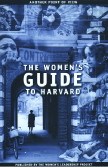 Two years in the making, the Women's Guide to Harvard was distributed to studentswomen and men alikeat the beginning of spring term. The 272-page book, edited by Peggy Lim '01 and published by the Harvard-Radcliffe Women's Leadership Project (an undergraduate group "devoted to increasing the number, effectiveness, and diversity of female leaders"), is something of a hybrid.
Two years in the making, the Women's Guide to Harvard was distributed to studentswomen and men alikeat the beginning of spring term. The 272-page book, edited by Peggy Lim '01 and published by the Harvard-Radcliffe Women's Leadership Project (an undergraduate group "devoted to increasing the number, effectiveness, and diversity of female leaders"), is something of a hybrid. On one hand, it is a toolbox: a comprehensive directory listing women in the Faculty of Arts and Sciences, extracurricular organizations (from Harvard Right to Life to Students for Choice), social groups, academic resources, scholarships and internships, and health-related information on everything from mental-health and gynecological care to sexual assault. At the same time, the guide's historical sections may teach undergraduate womenand remind alumnaejust what their forebears endured, and how far they've come.
There are withering recollections, like that of Adrienne Rich '51, LL.D. '90, at her twenty-fifth reunion: "In our male-dominated classes, we were being trained to...become companions and hostesses for executives, lawyers, nuclear physicists, politicians, psychiatrists, and, of course, Harvard professors.... (If I recall correctly, every engaged senior received a rosebud at our graduation luncheonreward for a lesson well learned.)" A generation later, Katherine Park '72, Jf '80, Ph.D. '81, found that "Being hit on by tutors and teaching fellowswe had no word, or even a mental category, for what later came to be called sexual harassmentwas an ongoing fact of life. Comments about 'Cliffie bitches' were too numerous even to noticefallout in part from that dreadful four-to-one ratio and from the general stigma attached in that period to smart, intellectual women." And yet, despite horrid experiences as a co-residency pioneer in Winthrop House, Park ultimately found community among the undergraduate women and men of the dayenough so that she has returned as Zemurray Stone Radcliffe professor of the history of science.
There are also emotionally cooler, but still vivid, evocations of different eras, such as "The Three Flavors of Radcliffe," by Faye Levine '65, Ed.M. '70, BI '74, the first woman executive editor of the Crimson. Of the exotic "lime" style of certain Radcliffe students, Levine wrote: "Girls who adopt it...probably give wholesome Harvard freshmen from Iowa their first proof that the East is indeed strange looking. Greek shoulder bags are extremely popular, as are ski jackets, black tights, pierced ears, half high heels, long unpolished fingernails, rain ponchos, 'Marimekko' dresses, primitive jewelry, and long hair. The most well-dressed of them imitate a European sort of gray-beige, expensive simplicity; the sloppy ones wear ski polo shirts and dungarees and can be called (to their probable disdain) 'beat.' They have generally been to Europe, or hitchhiked across America."
Whether for that kind of perspective on how the Harvard experience evolved, or for hands-on guidance on how to thrive in the College community today, the Guide would seem to have plenty to offer to readers of all persuasionsand genders. Lest any of the students who received copies be tempted to cast theirs aside too hastily, the back cover invites "female readers" to "check out the history of the foresisters" who attended Radcliffe as "the Annex," and "male readers" to encounter "plenty of information that may be directly useful to you (although you can probably skip the part about gynecological exams)." For more information, or to obtain a copy of the guide, contact the Ann Radcliffe Trust in Harvard College (annradtr@fas.harvard.edu).







